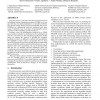Free Online Productivity Tools
i2Speak
i2Symbol
i2OCR
iTex2Img
iWeb2Print
iWeb2Shot
i2Type
iPdf2Split
iPdf2Merge
i2Bopomofo
i2Arabic
i2Style
i2Image
i2PDF
iLatex2Rtf
Sci2ools
114
click to vote
HPCA
1998
IEEE
1998
IEEE
FPGA Based Custom Computing Machines for Irregular Problems
Over the past few years there has been increased interest in building custom computing machines (CCMs) as a way of achieving very high performance on specific problems. The advent of high density field programmable gate arrays (FPGAs), in combination with new synthesis tools, have made it relatively easy to produce programmable custom machines without building specific hardware. In many cases, the performance achieved by a FPGA based custom computer is attributed to the exploitation of massive concurrency in the underlying application. In this paper we explore the sources of speedup for irregular problems in which is difficult to exploit such parallelism. We highlight 5 main sources of speedup that we have observed, namely the provision of high memory bandwidth, the use of flexible address generation hardware, the use of gather-scatter array operations, the use of lookup tables and the use of multiple tailored arithmetic units. By considering some representative examples of such irreg...
Related Content
| Added | 04 Aug 2010 |
| Updated | 04 Aug 2010 |
| Type | Conference |
| Year | 1998 |
| Where | HPCA |
| Authors | David Abramson, Paul Logothetis, Adam Postula, Marcus Randall |
Comments (0)

